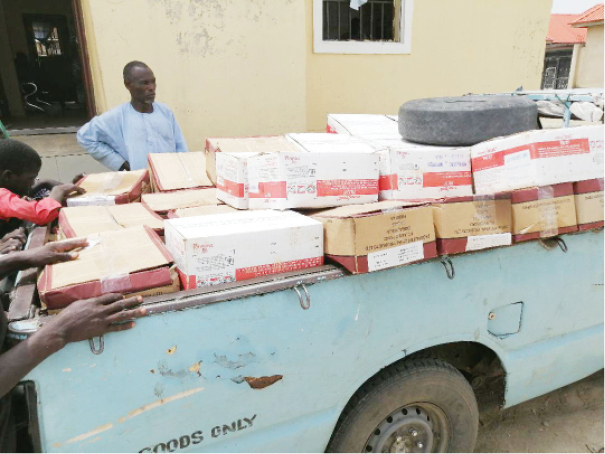The untold everyday story of Borno’s malnourished children (Part 2)
“Everyday mothers bring in children who are skinny and frail, and when we test them we find out they have cases of severe acute malnutrition,” Ms Babagana who works at a clinic in Muna camp for internally displayed person (IDPs) in Borno State, said. “In a week, we usually record at least 40 to 45 […]

Vehicle loaded with Ready To Use Therapeutic Food (RUTF) for treatment of children with acute malnutrition in Muna, Borno State.
“Everyday mothers bring in children who are skinny and frail, and when we test them we find out they have cases of severe acute malnutrition,” Ms Babagana who works at a clinic in Muna camp for internally displayed person (IDPs) in Borno State, said.
“In a week, we usually record at least 40 to 45 cases, which we immediately subject to treatment.”
She said a child that has been diagnosed with severe acute malnutrition can be revived if such a child is religiously administered with the special food supplement known as Ready to Use Therapeutic Food (RUTF).
At the second clinic in Muna, a Community C-MAM provider, Zainab Goni, said after recording 18 cases of severely malnourished children last week, they just have six cases between Monday and Tuesday adding that they can record between 40 and 30 new cases of severe acute malnutrition every week.
“Last week, we had many cases from new IDPs that have fled volatile locations like Mafa, Magumeri and Gajigana villages of Borno State,” she said.
Nutrition experts have said that malnutrition in children is not triggered by lack of food alone, but the ingestion of foods that do not contain basic nutrients for body development of a child.
Nutrition experts like Dr. Bitrus of UNICEF Maiduguri Field office said a child diagnosed with Severe Acute Malnutrition can begin to have a sign of improvement within the first seven days if administered with the RUTF.
At least 233,000 children under the age of six have been diagnosed and treated for Severe Acute Malnutrition in communities around Borno State between October 2018 to May this year, officials at the United Nations Children Fund (UNICEF) have said.
This was achieved via the DFID supported nutritional stabilization programme of the fund.
Yazara Bukar, a six months old pregnant woman who brought in her 18 months old son, Mohammed, to the clinic, told the C-MAM Provider, Ms Babagana that the boy suddenly began to lose weight with recurring cases of fever and loss of appetite.
It was later to be discovered that the mother continued to breastfeed her 18-months-old baby despite her pregnancy.
“I don’t have food to give him most of the time he is hungry,” she said. We have been on the run since Boko Haram attacked our communities about two months ago. The only thing I know I could afford to give him is my breast milk.”
At least about 30 to 40 new cases of children with Severe Acute Malnutrition are admitted weekly in the two clinics at Muna Camp.
“We have also noticed that a surge in the number of new cases of SAM has been due to more new arrivals of IDPs whose communities in Mafa, Gajigana, and Magumeri have been attacked by insurgents recently. And it means going by what we have recorded now, we should be expecting more cases as the week goes by,” said Ms Babagana.
Tackling the “huge task” as envisaged by the C-MAM providers at Muna IDP camp is what UNICEF nutrition officials at the Maiduguri Field Office have been trying to focus on under a renewed funding for the next three years.
Sanjay Das, a Nutrition Manager at the UNICEF Maiduguri Field Office, agreed with Ms Babagana, the C-MAM Provider that “there is still more work to be done in Borno State.”
According to Mr. Das, UNICEF has been able to secure additional support from DFID to the tune of 22 million Pounds, (about (N9.8 billion) to tackle the issue of child malnutrition for the next three years in Borno State alone.
Mr Das said the new programme would be a bit comprehensive because “it is going to be what we call Flexible Integrated And Timely (FIT) project which focuses mainly on Borno State to improve nutritional status,” said Mr. Das.
